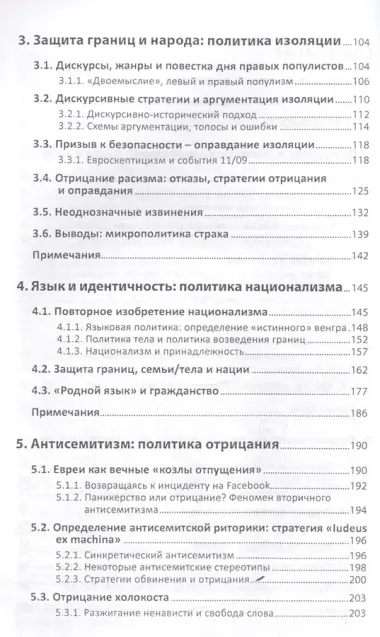Политика страха. Что значит дискурс правых популистов?
Description
Риторика правых популистов выходит в центр политической арены, а некоторые партии достигают самой вершины избирательной лестницы. Но можем ли мы объяснить, почему это происходит именно сейчас? Рут Водак прослеживает траекторию движения таких партий, с «задворок» политического ландшафта к центру, используя дискурсивно-исто-рический подход. Она фокусируется на дискурсивном конструировании национальных идентичностей и категорий «Других», которых исключают или закрывают им доступ к ресурсам. Ей удалось обнаружить широчайший спектр техник аргументации и дискурсивных стратегий, которые маскируют истинное лицо таких политиков и привлекают к ним все больше и больше избирателей. Это и стратегия просчитанной неоднозначности, и стратегия смены ролей жертва/преступник, и разнообразные ошибки обобщения, подмены тезиса, и стратегии создания «козлов отпущения» и конструирования страха. Изобилие примеров из жизни современных политиков указывает на обоснованность и актуальность взглядов автора. .Книга будет интересна социологам, лингвистам, политологам, психологам, философам, а также всем, кто интересуется этой динамикой, которая в корне меняет наш политический ландшафт. . .The right-wing rhetoric moves to the center of the political arena, and some parties reach the very top of the elective ladder. But are we able to explain why this happen nowadays? Ruth Wodak traces the trajectory of such parties' movement from the marginalized to central positions through the discursive-historical approach. She focuses on the discursive construction of national and transnational identities and of the categories of "Others" which are excluded or denied the access to the nation's resources. She managed to reveal a wide range of argumentative techniques and discursive strategies that mask the real face of such politics and attract more and more voters to them. Such strategies include a strategy of calculated ambivalence, a strategy of perpetrator/victim role-reversal, various fallacies of generalization, strawman fallacy and strategies of creating the scapegoats and of fear construction. The abundance of examples from the real life of modern politics points to the soundness and timeliness of the author's views. .The book will be of special interest for sociologists, linguists, experts in political sciences, psychologists, philosophers and for all those who are concerned with these dynamics that radically change our political landscape.
0








